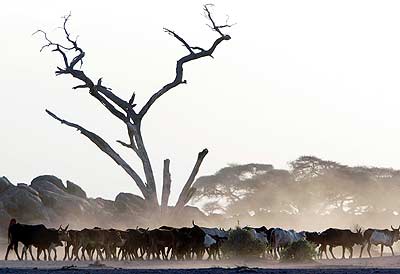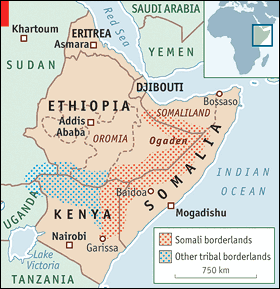 If you think that you can walk away from some of the world's problems and they will just go away - you are not living in the world I am. There are places in the world where things are beyond your definition of misery - and they are just going to get worse.
If you think that you can walk away from some of the world's problems and they will just go away - you are not living in the world I am. There are places in the world where things are beyond your definition of misery - and they are just going to get worse.BOSSASO is an exit point from the Horn of Africa and it is bursting. This port in northern Somalia already has 300,000 people, up from 50,000 in the 1990s. ... It is a typical Horn of Africa slum. Only the air is free. Several families split the rent on a cardboard shack. Fires sometimes break out, fanned by sea breezes, often burning people alive. Wells are private: filthy water is a commodity for sale. There are few jobs for the men. Women venture out to sift through the rubbish that blooms and shines like armour in seemingly every open space in Bossaso. Islamists pass through the slums, looking for likely recruits. Disease is a bigger worry. A local doctor reckons that a new epidemic could easily break out: polio and typhoid are already on the prowl.
 War, famine, pestilence, religious conflict, economic collapse. Fact is stranger than fiction.
War, famine, pestilence, religious conflict, economic collapse. Fact is stranger than fiction.The most immediate risk is of war breaking out between Somalia's Islamists, based in the capital, Mogadishu, and the “secularist” Somali government holed up in Baidoa and backed by “Christian” Ethiopia and the United States
... The Islamist advance in Somalia was a response to political anarchy, not a symptom of population or environmental pressures. But UN relief agencies are sounding the alarm on these pressures. They are specially concerned about south Somalia and Ethiopia's vast Ogaden desert, where malnutrition rates are far higher than the 15% which signals a humanitarian emergency (nutrition rates in the Horn generally are the lowest in the world). A drought last year resulted in massive loss of livestock in both regions. A Somali war involving Ethiopia would be fought asymmetrically, with Islamist guerrillas striking across Somalia and inside Ethiopia, raising the chances of catastrophic famine.
...
the Horn's uncontrolled population growth appears even more explosive. The borderlands have among the highest fertility rates in the world, particularly so among the Somalis. Women in these areas are likely to have six or seven children, against three in the cities. Over half the population is aged 15 or under. There has been little progress in family planning. In remote areas there is no provision for birth control at all. A recent study by the Ethiopian government, which is making tentative steps to reduce population growth, found that only 3% of Somali women in Ethiopia had access to contraception, compared with 45% of women in Addis Ababa.
Some parts of the borderlands already look like something out of “Collapse: How Societies Choose to Fail or Succeed”, a study of environmentally ruined societies by Jared Diamond, an American academic. The Horn is among the most degraded ecosystems in the world, with only 5% of its original habitat remaining. According to Conservation International, an NGO, the main culprits in the borderlands are overgrazing and cutting down trees for fuel and charcoal.
 The four horsemen are coming stronger - they are already here. This time I do not think that the West will come in to save Islamists bent on destroying the West. As the ill winds blow, the West will bolt its doors and let the storm do its business.
The four horsemen are coming stronger - they are already here. This time I do not think that the West will come in to save Islamists bent on destroying the West. As the ill winds blow, the West will bolt its doors and let the storm do its business.
 If you think that you can walk away from some of the world's problems and they will just go away - you are not living in the world I am. There are places in the world where things are beyond your definition of misery - and they are just going to get worse.
If you think that you can walk away from some of the world's problems and they will just go away - you are not living in the world I am. There are places in the world where things are beyond your definition of misery - and they are just going to get worse. War, famine, pestilence, religious conflict, economic collapse. Fact is stranger than fiction.
War, famine, pestilence, religious conflict, economic collapse. Fact is stranger than fiction. The four horsemen are coming stronger - they are already here. This time I do not think that the West will come in to save Islamists bent on destroying the West. As the ill winds blow, the West will bolt its doors and let the storm do its business.
The four horsemen are coming stronger - they are already here. This time I do not think that the West will come in to save Islamists bent on destroying the West. As the ill winds blow, the West will bolt its doors and let the storm do its business.
No comments:
Post a Comment